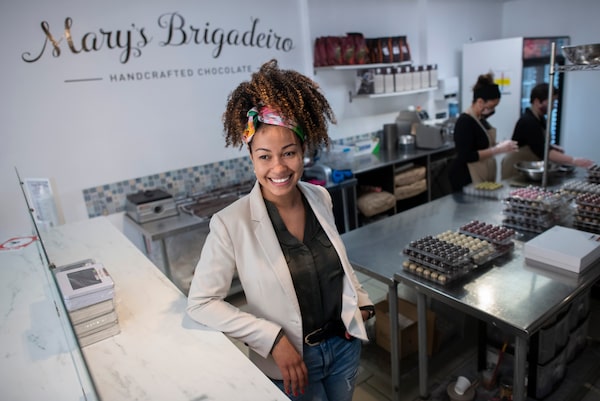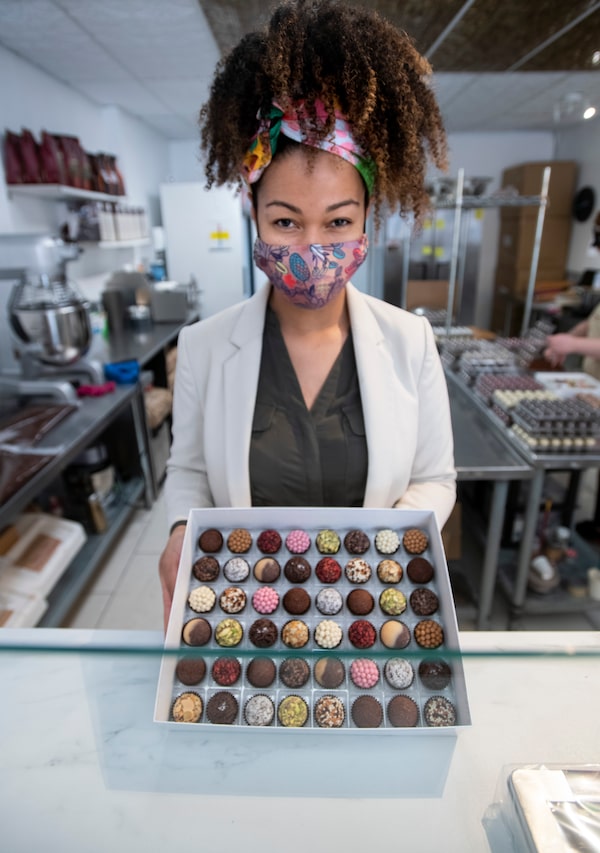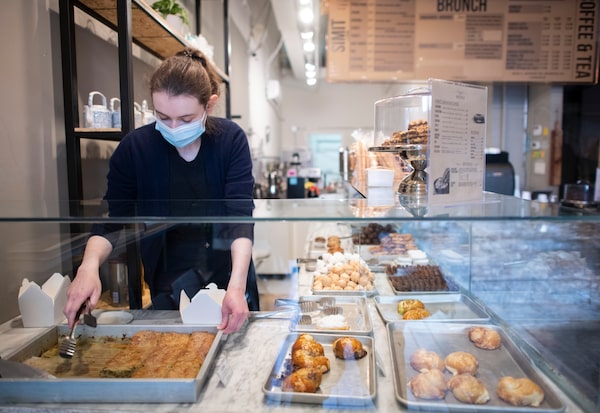
Mariane Oliveira, owner of Toronto chocolaterie Mary’s Brigadeiro, is photographed on March 24, 2021.Fred Lum/The Globe and Mail
Last year, Toronto software developer Randy Singh saw the plight of restaurants shutting down because of the pandemic and came up with an idea to help others keep afloat as they struggled to operate solely on takeout service.
He called it Not UberEats, a bold declaration that this was different from popular delivery giants. But it’s not a delivery service. Not UberEats is an online catalogue of Toronto restaurants that offer their own delivery, without using a third-party service such as UberEats, SkipTheDishes or DoorDash. Third-party food delivery services can charge a commission of up to 30 per cent, which takes away much of a restaurant’s profits.
The website operates as a non-profit service, and Mr. Singh says he plans to keep it that way.
“We want to support local as best as we can,” he said of the site. “When you order directly, you’re still saving yourself money [by avoiding extra delivery costs] and helping your local community,” Mr. Singh said.
Users can browse Not UberEats for restaurants by area or type of cuisine and the website will redirect them to the restaurant’s direct-delivery form. Users can also submit restaurants to be listed for free.
Not UberEats is just one of the services that have popped up during the pandemic that are helping restaurants navigate the challenges of taking orders and delivering food when many of the existing industry players are either too expensive or too impractical for smaller operations.
In December, the Ontario government introduced the Supporting Local Restaurants Act, prohibiting food delivery services from charging commissions of more than 20 per cent, but even that is a high cost for small-business owners, and the cap will only last under COVID-19 health measures.
And for some restaurants, doing their own deliveries – especially since reaching more customers through Not UberEats – has not always been easy.
Dawn Chapman, owner and operator of Lazy Daisy Cafe in Toronto, poses for a portrait on January 20, 2021.Aaron Vincent Elkaim/The Globe and Mail
Dawn Chapman, owner of Lazy Daisy’s Cafe in Toronto, listed her restaurant on Not UberEats near the start of the pandemic. Ms. Chapman uses the site primarily to direct customers to Lazy Daisy’s in-house grocery delivery service. Originally, she had hired her own driver for deliveries, but once Toronto began to open up again, she saw a drop in demand that made it uneconomical.
After that, she spent weekend mornings making deliveries herself, but said it eventually “became a bit haphazard” and more than she could handle.
Her café – located in Toronto’s east end near Coxwell and Gerrard Streets – is part of the Gerrard India Business Improvement area (BIA), where local members have floated the idea of finding a full-time driver or two that they could share for deliveries to ease the financial burden.
The suggestion hasn’t been implemented in the BIA yet, but Toronto startup Tayza does just that. Tayza was founded last year by 23-year-old Mohit Raj after he had a couple of bad experiences with Amazon’s service.
“[Amazon’s] customer service was really subpar. I thought someone could do this better… so we built a customer-centric delivery service,” Mr. Raj said.
Mariane Oliveira, owner of Toronto chocolaterie Mary’s Brigadeiro and a member of the Gerrard India BIA, said she uses Tayza to make her deliveries. Its rates start at $5.25 for same-day delivery.

Mariane Oliveira, owner of Toronto chocolaterie Mary’s Brigadeiro, is photographed on March 24, 2021.Fred Lum/The Globe and Mail
To make a profit through UberEats, Ms. Oliveira says she would have to charge more for her products, but that isn’t something she wants to do. “We were looking [at] UberEats, but their charges are really, really high. For a small business, in my case, it was not worth [it].”
Working with Tayza has been “awesome,” Ms. Oliveira says. “The price is pretty good, especially for the customers. It’s working very well.”
For other small-business owners, such as John Ulgen, working with a delivery app has never been part of the plan, so using Not UberEats has been “very helpful to get through these days.”
“It’s very concerning to us, the fees that were involved. Not just on the business side, on the customer side as well,” said Mr. Ulgen, who is co-owner of Turkish bakery Simit & Chai.
Mr. Ulgen added that with large delivery companies having such a high demand and frequency of deliveries, the quality of his food – bagels and other brunch items – suffers “immensely” if sitting around for too long.
“We’re absolutely not becoming a part of [large delivery services]. We will try to take care of everything ourselves,” he said.
Postpandemic, Mr. Singh says he hopes people keep using Not UberEats and cataloguing more restaurants. “We definitely want to see this continue to expand in other cities as well.”

Pasha Striletska, an assistant manager at Simit & Chai, is photographed on March 17, 2021.Fred Lum/The Globe and Mail
Your time is valuable. Have the Top Business Headlines newsletter conveniently delivered to your inbox in the morning or evening. Sign up today.